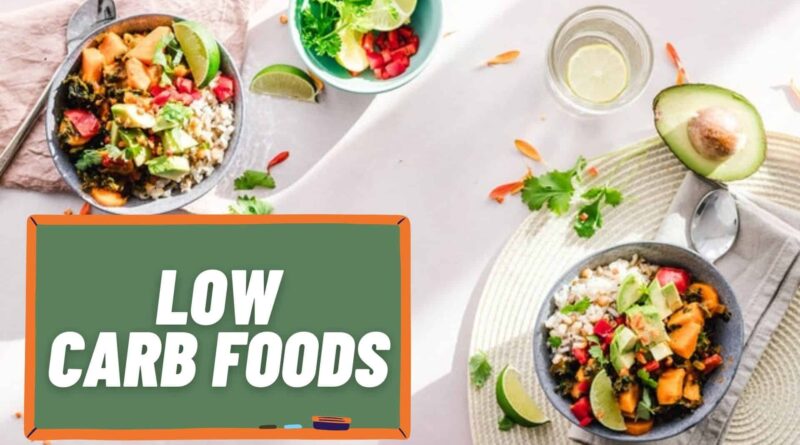Low-Carb Diet Guide For Beginners
In recent years, low carb diets have gained popularity. In Low-Carb diets, you limit carbohydrate intake according to the style of diet. Many studies have shown that low-carb diets contribute to rapid weight loss, improved body composition and other aspects of health. Here is Low-Carb diet guide for beginners
See Also :
- 7 Ways To Overcome Laziness To Exercise
- 7 Habits That Drain Your Energy
- 7 Healthy Tips for Teenagers
- 13 Healthy Foods For Athletes
- Wrong Beliefs That Hinder Weight Loss
- Low-Carb Diet Guide For Beginners
Low-Carb Diet Guide For Beginners
It can be said that a low-carb diet is the most effective way to lose weight in the short term. We always associate starving to be thin by remembering the word “diet.” One of the most important features of low-carb diet is weight loss without feeling hungry. In this plan, you learn how to easily lose extra kilos without enduring excruciating hunger.
Maybe your intention isn’t just to lose weight and you’re looking to improve your health as well. If you are looking to prevent diabetes, improve cholesterol and prevent dementia diseases like Alzheimer’s, the Low-carb diet help you greatly in achieving it.
How is Low-Carb diet effective?
In Low-carb diets, the aim is to eliminate unhealthy and bad carbohydrate sources such as flour and white rice, as well as the use of whole grains such as oats. Many studies have shown that refined carbohydrates increase insulin. Insulin is a storage hormone and commands fat storage by sending signals to cells. This diet causes less insulin secretion, resulting in insulin resistance not happening and your body starts to dissolve fats.
In low-carb diet, by limiting carbohydrate intake, we increase the intake of high-quality and healthy proteins and fats to feel more saturated and burn fat faster.
Low Carb Foods
Identifying foods high in carbohydrates is relatively easy. Anything that contains sugar or flour is usually high in carbohydrates. Fruits that contain natural sugars, are also high in carbohydrates, as are processed foods. Products of animal-derived are more likely to be low-carb.
Meat
All meats are carb-free except processed meats. Ham, hot dogs, smoked sausages, they all contain carbohydrates. Always read the label before eating this meat to make sure you don’t exceed your daily carbohydrate intake. Artificial meats can also contain carbohydrates, so vegetarians should be very careful when choosing their proteins. Fish, poultry, red meat and shellfish are all carb-free.
Vegetables
In addition to vegetables such as potatoes and corn, vegetables mostly have low carbohydrates. The more vegetable fiber it contains, the lower the carbohydrate. A good option is onions, lettuce, sprouts, celery, all of which contain less than 1 g of carbohydrates per serving. Slightly higher but still has a low carbohydrate content are asparagus, broccoli, cauliflower, kale, pumpkin and spinach, all of which contain 3 g or less of carbohydrates.
Other products
Milk contains lactose, a form of sugar. If you are trying to limit your carbohydrate intake, be careful consuming yogurts, milks and creams, as they can contain high amounts of carbohydrates. Cheese, on the other hand, is lower in carbohydrates. Cheddar cheese has zero carbohydrates, but a number of other cheeses have less than 1 g of carbohydrates per serving. Parmesan and goat’s cheese have less than 0.5 g of carbohydrates per 1 oz serving. Mozzarella, Gouda, blue cheese, cream cheese and Swiss cheese all contain 1 g or less of carbohydrates per serving. Eggs have low carbohydrates.
If you are trying to lose weight then your diet should be based around these foods, low in carbohydrates.
- Meat: beef, chicken, pork, beef, lamb, etc. The best are those that come from animals that have been fed grazing.
- Fish: salmon, trout etc. The best are those that have been caught in the sea, and not fish farming.
- Vegetables: broccoli, spinach, carrots, etc.
- Fruit: apples, oranges, strawberries, bananas etc.
- Eggs: those enriched with omega 3 or pasteurized.
- Nuts and seeds: walnuts, almonds, sunflower seeds, etc.
- Dairy products: cheese, butter, cream and yogurt are the best options.
- Healthy fats and oils: coconut or olive oil, butter or fish oil.
If you are a healthy person, active and do not have to lose weight or have to lose little, occasionally you can afford to eat a little greater amount of carbohydrates, for example:
- Tubers: for example, potatoes.
- Gluten-free grains: rice, quinoa, oats, etc.
- Legumes: lentils, beans, chickpeas, etc.
- Dark chocolate: always in moderation and choosing one with a high cocoa content, 70% or higher.
- Wine: choose wines without added sugars or carbohydrates.
Drinks you can drink
Our diet is not composed only of solid foods. Drinks are a fundamental part of our diet and need to be selected correctly if we really want to see good progress in the body.
The drinks you can enjoy are as follows:
- Coffee.
- Water.
- Carbonated drinks without artificial sweeteners.
Foods you should avoid
You should avoid the below 6 food groups –
- Sugar: Non-alcoholic beverages, juices, candy, ice cream and other products that have additive sugar.
- Refined cereals: wheat, rice, barley, buckwheat, bread, breakfast cereals and pasta.
- Trans fats: hydrogenated oils.
- Diet and low fat products: Many dairy products, breakfast cereals and biscuits
- Processed foods: Avoid it if the food form was made seemingly in the factory.
- Starchy vegetables: If you follow a low-carb diet, it is best to avoid eating starchy vegetables.
Natural Beauty Tips – Beauty Tips
See Also :
- 12 Ways To Manage Depression Without Medication
- 7 Ways To Overcome Laziness To Exercise
- 7 Habits That Drain Your Energy
- 8 Foods That Increase the Risks of Heart Attacks
- 7 Healthy Tips for Teenagers
- What is Granola? Is Granola Healthy?
- Red clover and its medicinal properties
- 7 Home Remedies To Relieve Constipation Naturally
- 5 Easy Ways to Control Overeating Desire
- Heart Attack At A Young Age





